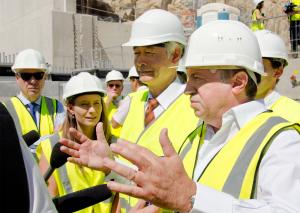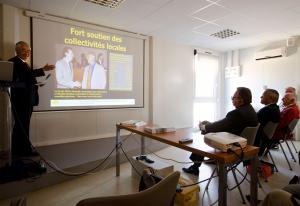Council president renews his commitment to ITER
13 Jul 2012
-
Robert Arnoux
Amidst a forest of microphones and TV cameras, Mr Guérini, president of the Bouches-du-Rhône Council, communicated his enthusiasm for the ITER Project.
Ten years ago, as Cadarache was considering an early bid to host ITER, the local governments of the Provence-Alpes-Côte-d'Azur (PACA) region proposed to participate in the financing of the project. The Regional Council PACA, the six départements that form the Region, and the Greater Aix-en-Provence Community agreed to allocate in total EUR 467 million to the construction of ITER over a period of ten years.
Jean-Noël Guérini, president then and now of the Bouches-du-Rhône Council (Conseil général), was among the local politicians who believed ITER was, in his own words, "a unique opportunity to boost the economic development of our region." In 2002, the assembly he presided voted an envelope of EUR 152 million for the construction of the ITER Project.
The trigger for this decision was an address by René Pellat, French Commissioner to Atomic Energy at the time, to the Bouches-du-Rhône Council on 22 June 2002 in Marseille. "Without you," he told Mr Guérini and the assembled councilmen, "we won't be able to have ITER."
On the occasion of Mr Guérini's visit to ITER on Friday 13 July, Director-General Motojima chose to feature a picture of the 2002 meeting in the presentation he gave to the president, the 17 councilmen that accompanied him and a party of some twenty journalists.
The photo of the 2002 meeting that Director-General Motojima included in his presentation brought back strong memories ...
For Mr Guérini, it was a charged moment emotionally. Ten years have passed but his commitment to ITER remains as strong as it was then. And the figures of the economic benefits for the Region that Jérôme Pamela, director of Agence Iter France, presented to him confirmed the accuracy of his conviction: since work began on the ITER site in 2007, companies based in the Bouches-du-Rhône département have been awarded EUR 454 million worth of contracts—a serious boost, as Mr Guérini had anticipated, to the local economy.
As the visitors stood in the Tokamak Seismic Pic amidst a forest of microphones and TV cameras, Mr Guérini strongly expressed his enthusiasm for the project. "I know you are working for the benefit of the future generations and I hope that the media that have gathered here will be able to convey this message. As for me, I will continue to support your fantastic project as I have done, tirelessly, for the past ten years."



